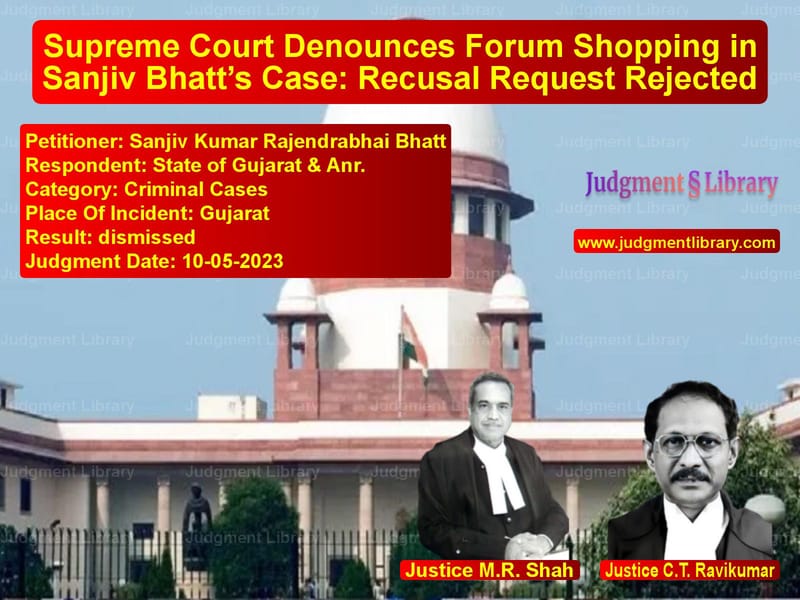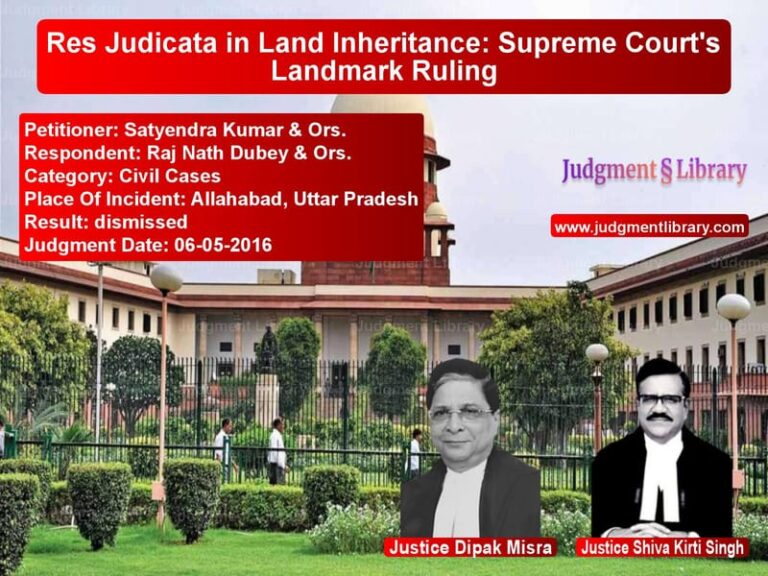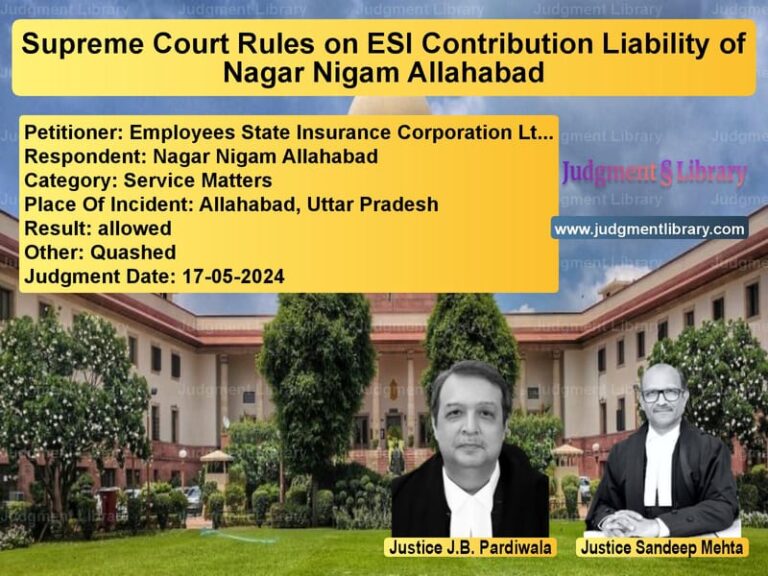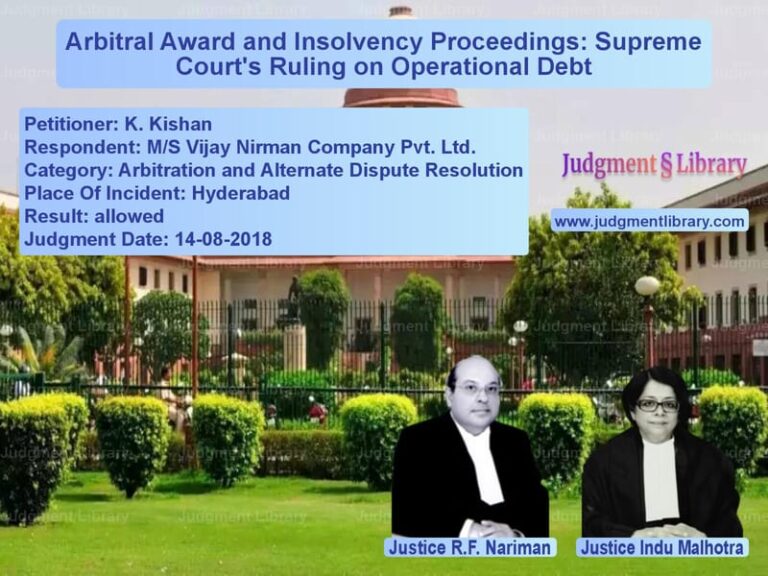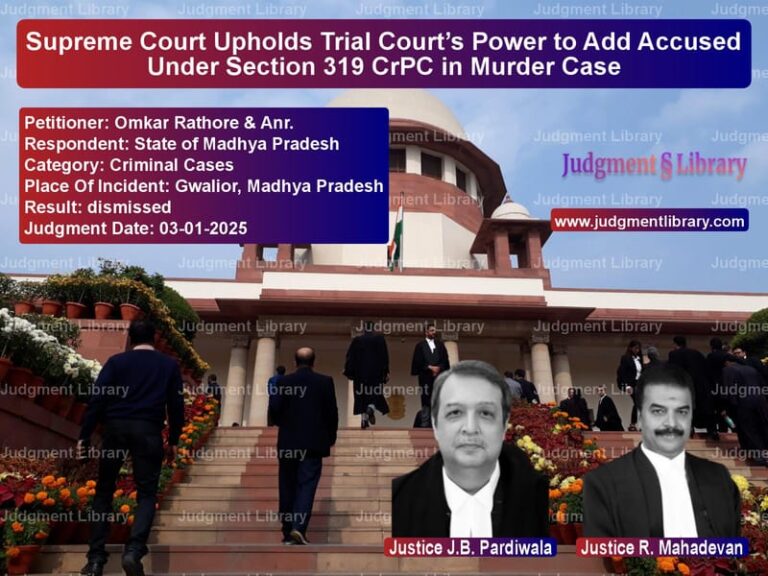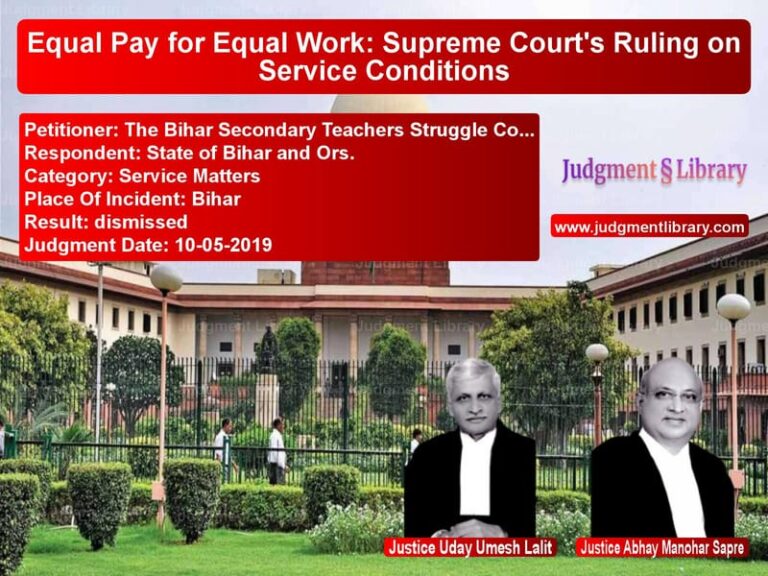Supreme Court Denounces Forum Shopping in Sanjiv Bhatt’s Case: Recusal Request Rejected
The Supreme Court of India, in the case of Sanjiv Kumar Rajendrabhai Bhatt vs. State of Gujarat & Anr., delivered a stern ruling against the practice of forum shopping and bench hunting. The case revolved around the petitioner’s request for the recusal of one of the judges on the bench, citing past observations made by the judge in a related matter. The Court outrightly rejected the recusal request, deeming it an attempt to manipulate judicial proceedings and avoid an unfavorable bench.
Background of the Case
The case pertains to a special leave petition (SLP) filed by Sanjiv Bhatt, a former Indian Police Service (IPS) officer from Gujarat, who has been embroiled in multiple legal cases. In this instance, the petitioner sought relief concerning an FIR that had already been adjudicated upon by the High Court.
During the hearing, the petitioner’s counsel submitted a letter requesting one of the judges on the bench to recuse themselves from the matter. The reason cited was that in 2011, the same judge, while serving on the Gujarat High Court, had made strictures against the petitioner regarding his delaying tactics in a related case.
Legal Issues Considered
The Supreme Court examined the following key legal questions:
- Whether a judge’s prior involvement in a related case automatically disqualifies them from hearing a subsequent matter involving the same party.
- The legal validity of recusal requests based on past judicial observations.
- The principle of forum shopping and its impact on the integrity of the judicial process.
- The broader implications of allowing such recusal requests on judicial independence and fairness.
Arguments by the Petitioner
The petitioner’s counsel, Senior Advocate Devadatt Kamat, argued that:
- The judge in question had previously made adverse comments against the petitioner in 2011.
- The principle of judicial propriety required that the judge recuse themselves to avoid any appearance of bias.
- The right to a fair trial included the right to an impartial bench, and even a perception of bias warranted recusal.
- They relied on the Supreme Court’s ruling in Ranjit Thakur vs. Union of India (1987) 4 SCC 611, which emphasized the principle that ‘justice must not only be done but must also be seen to be done.’
Arguments by the Respondents (State of Gujarat & Original Complainant)
The State of Gujarat and the original complainant, represented by Senior Advocates Maninder Singh and A.N.S. Nadkarni, opposed the recusal request, arguing that:
- The request was a clear case of forum shopping and bench hunting, aimed at avoiding an unfavorable judicial outcome.
- The petitioner had previously appeared before the same judge in a related matter in 2020 and had raised no such objection.
- The delay in pressing the recusal request—after multiple hearings—indicated that it was a last-minute attempt to stall proceedings.
- The presence of prior judicial observations did not constitute bias, as judges are expected to adjudicate matters based on law and evidence, not personal predispositions.
Supreme Court’s Observations
1. Strong Condemnation of Forum Shopping
The Supreme Court categorically condemned the practice of forum shopping, stating that litigants cannot be allowed to choose their bench to suit their convenience. The Court observed:
“This request is nothing but an attempt to indulge in forum shopping and bench hunting. Such practices must be deprecated in the strongest possible terms.”
2. No Valid Grounds for Recusal
The Court rejected the argument that a judge’s past judicial remarks in a related case created grounds for recusal. It noted that judges often deal with cases involving the same parties, and prior involvement does not imply bias. The Court stated:
“Merely because some proceedings might have been heard by one of us before the High Court in connection with the present matter and some observations were made against the petitioner on the delaying tactics, cannot be a ground to accede to the request.”
3. Delay in Raising the Recusal Request
The Supreme Court took serious note of the delay in raising the recusal plea. The Court observed that the petitioner had appeared before the same judge in related proceedings in 2020 and had made no such request. Additionally, the current SLP had been listed multiple times after the recusal letter was circulated on November 9, 2022, yet the request was not pressed until the final hearing.
The Court noted:
“The request was not pressed when the matter was listed on multiple occasions, including December 14, 2022, January 10, 2023, February 27, 2023, March 28, 2023, and May 2, 2023. However, when the matter reached the stage of final hearing, the recusal letter was suddenly brought up, making the request highly suspect.”
Final Judgment
The Supreme Court ruled that:
- The recusal request was denied.
- The petitioner’s conduct was an attempt to manipulate judicial proceedings, which was strongly condemned.
- The case would proceed before the same bench as scheduled.
- The principle of judicial independence must be upheld, and litigants should not be allowed to dictate the composition of the bench.
Key Takeaways
- Strict Stance Against Forum Shopping: The judgment sets a strong precedent against litigants attempting to manipulate judicial proceedings by seeking a favorable bench.
- Judicial Independence Upheld: The ruling ensures that judges cannot be removed from cases based on frivolous claims of bias.
- Timing Matters in Recusal Requests: The Court emphasized that last-minute recusal requests, especially after multiple hearings, would not be entertained.
- Judicial Remarks Do Not Indicate Bias: Prior judicial comments in a related case do not automatically disqualify a judge from hearing future matters involving the same party.
Conclusion
The Supreme Court’s decision in Sanjiv Kumar Rajendrabhai Bhatt vs. State of Gujarat & Anr. reaffirms the principles of judicial integrity and independence. By rejecting the recusal request and condemning forum shopping, the Court has sent a clear message that litigants cannot manipulate the legal system to suit their interests. The ruling serves as a critical safeguard against attempts to undermine the judiciary’s authority and ensures that justice is administered fairly and impartially.
Petitioner Name: Sanjiv Kumar Rajendrabhai Bhatt.Respondent Name: State of Gujarat & Anr..Judgment By: Justice M.R. Shah, Justice C.T. Ravikumar.Place Of Incident: Gujarat.Judgment Date: 10-05-2023.
Don’t miss out on the full details! Download the complete judgment in PDF format below and gain valuable insights instantly!
Download Judgment: sanjiv-kumar-rajendr-vs-state-of-gujarat-&-a-supreme-court-of-india-judgment-dated-10-05-2023.pdf
Directly Download Judgment: Directly download this Judgment
See all petitions in Bail and Anticipatory Bail
See all petitions in Custodial Deaths and Police Misconduct
See all petitions in Judgment by Mukeshkumar Rasikbhai Shah
See all petitions in Judgment by C.T. Ravikumar
See all petitions in dismissed
See all petitions in supreme court of India judgments May 2023
See all petitions in 2023 judgments
See all posts in Criminal Cases Category
See all allowed petitions in Criminal Cases Category
See all Dismissed petitions in Criminal Cases Category
See all partially allowed petitions in Criminal Cases Category

